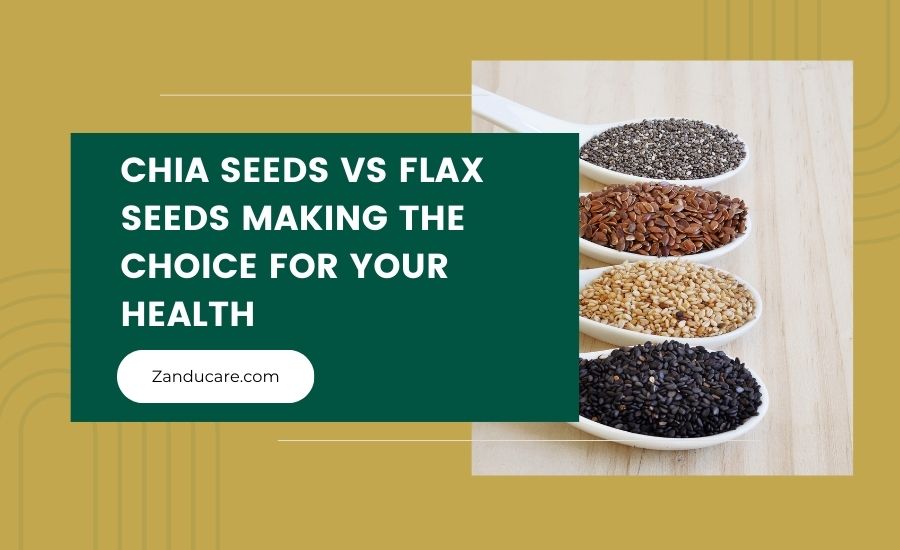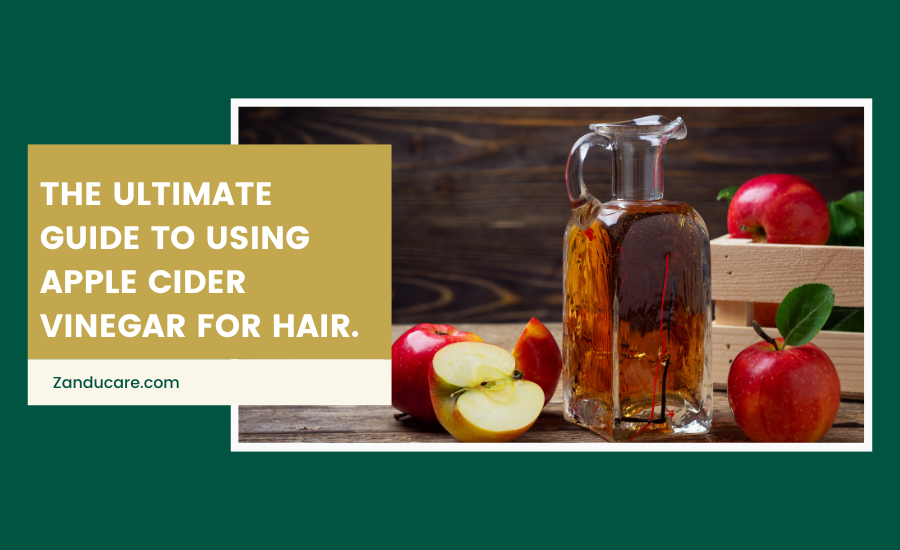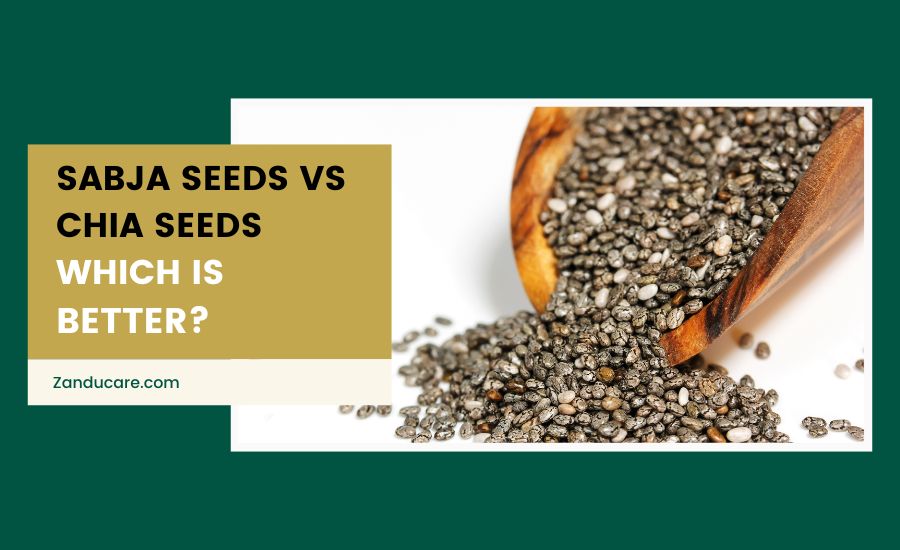
Chia Seeds vs Flax Seeds: Benefits, Uses, and Which is Better?
Are you sick and tired of having the same boring meal each day? It's time to add some flavour and nourish your body with the necessary nourishment. Superfoods like flax and chia seeds are easy to include in your morning routine and have many health advantages. They not only give your food a delightful, although subtle, nutty flavour and crunchy texture, but they are also a great source of fibre, protein, and other essential nutrients.
This chia seeds vs flax seeds for weight loss guide will compare and contrast the health advantages of chia and flax seeds and offer five satisfying and energising breakfast ideas. So grab your apron and get ready to use these nutrient-dense seeds to kickstart your day!
|
Did You Know
|
Chia Seeds vs Flax seeds

Both flaxseeds and chia seeds are rich sources of protein and fibre. Flaxseeds are oval-shaped and have a more robust, nutty flavour than chia, which are bland, tasteless, and round. Aside from flavour and form, there are also significant variations in fibre content, omega-3 fatty acids, minerals, antioxidants, cost, and accessibility. We examine the main variations in more detail so you can determine which seed will be the ideal nutritious addition to help you feel your best!
What are Chia seeds?
Salvia Hispanica, commonly referred to as chia, is an herbaceous plant in the Lamiaceae family. It is indigenous to southern Mexico and northern Guatemala. This plant produces several dried indehiscent fruits, often known as seeds.
Chia is now grown in Argentina, Bolivia, Peru, Guatemala, Mexico, Australia, and Colombia. In the sixteenth century, pre-Columbian Indians used chia to increase their strength, vitality, and endurance. Chia seeds are used to extract oil, which is then used in cosmetic products. It's possible that the plant's other parts—the roots, leaves, and branches—were less frequently employed to treat respiratory illnesses.
Nutritional value of Chia seeds
The nutritional value of Chia seeds per 100 grams is as follows:
|
Nutrients |
Content per 100 g |
|
Water |
5.8 g |
|
Carbohydrates |
42.1 g |
|
Protein |
16.5 g |
|
Fats |
30.7 g |
|
Energy |
486 kcal |
|
Fibre |
34.4 g |
|
Iron |
7.72 mg |
|
Calcium |
631 mg |
|
Magnesium |
335 mg |
|
Sodium |
16 mg |
|
Potassium |
407 mg |
|
Phosphorus |
860 mg |
|
Copper |
0.924 mg |
|
Zinc |
4.58 mg |
|
Manganese |
2.72 mg |
|
Selenium |
55.2 µg |
|
Vitamin A |
54 IU |
|
Vitamin B1 (Thiamine) |
0.62 mg |
|
Vitamin B2 (Riboflavin) |
0.17 mg |
|
Vitamin B3 (Niacin) |
8.83 mg |
|
Vitamin B9 (Folate) |
49 µg |
|
Vitamin C |
1.6 mg |
|
Vitamin E |
0.5 mg3 |
Ways to use Chia Seeds

Chia pudding
Blend chia seeds with your preferred plant-based or dairy milk and refrigerate until it takes on gel consistency. To give more taste and texture, add nuts or fruits.
Overnight oats
Mix chia seeds with milk, rolled oats, and other toppings like honey, nuts, and fruits. Put it in the fridge for the entire night to make a filling and tasty breakfast.
Smoothies
To add extra nourishment to your favourite smoothie, blend in some chia seeds. The seeds increase thickness and supply more nutrients and fibre.
Baked goods
For an added nutritional boost, mix chia seeds into the dough for muffins, cookies, or bread.
Chia jam
To produce a spreadable fruit condiment, mix mashed fruit with chia seeds.
Also read:
What are Flaxseeds?
Flaxseeds are small and shaped more like pumpkin seeds than circular ones. They are also available in brown and golden colours and were present in human diets in Babylon as early as 3000 BC. Although the history of flaxseeds does not feature Aztec warriors, it does assert that King Charlemagne established rules in the eighth century mandating the consumption of flaxseed for its health advantages by all of his citizens.
Flaxseed, sometimes called linseed, is a popular ingredient in many consumer goods today. It is also fed to cattle like cows and chickens to increase the omega-3 fatty acid content of their flesh.
Though they are said to have originated in Egypt, flaxseeds are derived from the blossom of the plant and may be produced practically anywhere in North America. Despite their diminutive size, these two seed types have surprisingly high nutritional content.
Nutritional value of Flaxseed
|
Nutrient |
Percentage Content |
|
Protein |
0.11 g |
|
Total lipid (fat) |
100 g |
|
Water |
0.12 g |
|
Energy |
884 kcal |
|
Calcium |
1 mg |
|
Zinc |
0.07 mg |
|
Phosphorus |
1 mg |
|
Choline |
0.2 mg |
|
Fatty acids (total saturated) |
8.98 g |
|
Vitamin E |
0.47 mg |
|
Fatty acids (total monosaturated) |
18.4 g |
|
Fatty acids (total polyunsaturated) |
67.8 g |
|
Vitamin K (phylloguione) |
0.0093 mg |
This nutrient value is per 100 grams of flaxseed oil.
Ways to use Flaxseeds
Flaxseeds oil
To reap the benefits of flaxseed oil's healthful fats and nutrients, sprinkle it over cooked vegetables or use it as a salad dressing.
Flax egg
To produce a vegan egg alternative for baking recipes, mix water and milled flaxseed.
Ground Flaxseed
The fine powder of flax seeds enhances the absorption of nutrients. Add the ground seeds to cereal, smoothies, or yoghurt.
Baked goods
For extra fibre and nutrition, use ground flaxseed in baked products such as bread, pancakes, and muffins.
Flaxseed yoghurt topping
To add a crispy and wholesome garnish to yogurt or cereal, sprinkle whole or ground flax seeds on top.
Benefits of chia seeds vs flax seeds
Chia seeds and flax seeds are both loaded with health advantages. They support digestive health, help control weight, are high in heart-healthy omega-3 fatty acids (ALA), and assist in blood sugar regulation. Because of their high calcium, phosphorus, and magnesium content, both seeds are also beneficial to bone health. Additionally, chia seeds are a superior calcium source; they are suitable for strengthening bones.
Due to their high lignan content, flax seeds may help balance hormones and offer additional antioxidant advantages. Some people find chia seeds more appealing because of their lighter flavour.
These seeds are excellent providers of plant-based omega-3 fatty acids, which are essential for inflammation reduction and mental wellness. Including chia and flax seeds in the diet can improve general health and well-being while offering a variety of nutrients and advantages.
Conclusion
With so many health advantages, chia and flax seeds can be beneficial supplements to a well-balanced diet. Chia seeds' high fibre and protein content aid in digestion and weight management while serving as a great source of plant-based omega-3 fatty acids that support heart and brain health.
Similar advantages come from flax seeds' high ALA content, which supports heart health and blood sugar regulation, as well as their lignans' strong antioxidant qualities. Either way, including these small but powerful seeds to your diet, will enhance your general health and give your favourite recipes an extra nutritional boost. You can even use both chia and flax seeds.
FAQs
1. Which is better, flaxseed or chia seeds?
Flax seeds and chia seeds are both healthy. Additionally, both have similar benefits for digestion, blood sugar regulation, and heart health. But flax seeds seem to have a small edge, particularly in decreasing appetite and hunger and the chance of developing certain cancers.
2. Can I eat chia seeds vs flax seeds constipation ?
Chia and flax can be eaten together since they both offer a variety of nutrients, such as fiber, plant protein, and omega-3 fatty acids. Chia seeds lack lignans; therefore, adding flaxseeds to chia increases its advantages.
3. Is flaxseed good for females?
Women can particularly benefit from flax seeds. They are known to increase the likelihood of conception, aiding women's fertility. Additionally, these seeds aid in the restoration of hormonal balance and regular ovulation.
4. What not to mix with chia seeds?
Chia seeds have a high omega-3 fatty acid content. High blood levels of omega-3 fatty acids have been linked to an increased risk of bleeding. As such, consuming chia seeds with foods or supplements high in omega-3 fatty acids is discouraged.
5. Who should not eat flax seeds?
- If you are nursing a baby or pregnant, consult your doctor before consuming flaxseed.
- Men who have prostate cancer should consult their physician before consuming flaxseed.
- Individuals who have narrowed oesophagal reflux disease, inflammatory bowel disease, or colon blockage should avoid flaxseed. It has a lot of fibre and can exacerbate the illness.
6. What is the biggest disadvantage of flax?
The NCCIH adds that eating flaxseed without enough water might exacerbate constipation and increase the risk of intestinal obstruction. Moreover, diarrhoea may result from consuming excessive amounts of flaxseed or flaxseed oil.
7. Who cannot eat chia seeds?
Consult your doctor before incorporating chia seeds into your diet if you're taking medication for diabetes or hypertension, as these supplements may impact your blood pressure and blood sugar levels. Furthermore, you might want to exercise caution when including foods high in fibre, like chia seeds, into your diet if you already have gastrointestinal problems.
8. Can we drink flaxseed water daily?
Yes, as part of a balanced diet, you can have flaxseed water daily. Flaxseeds are an excellent source of fiber, other minerals, and omega-3 fatty acids. Some of these nutrients can be released and made more available by soaking flaxseeds in water for the entire night. But moderation is crucial, just like with any meal or supplement.
9. What is another name for Chia seeds?
Salvia hispanica seed
10. Do flax seeds affect hormones?
There is evidence that the phytoestrogens, including lignans, found in flaxseed may affect levels of sex hormones. Secoisolariciresinol glycoside, the primary lignan found in flaxseed, is transformed by intestinal bacteria into the mammalian lignans enterolactone and enterodiol.
References:
- Salvia Hispanica, commonly referred to as chia, is an herbaceous plant in the Lamiaceae family. (https://www.researchgate.net/)
- Protein- 16.5 g (https://www.researchgate.net/)
- For an added nutritional boost, mix chia seeds into the dough for muffins, cookies, or bread. (https://www.researchgate.net/)
- Due to their high lignan content, flax seeds may help balance hormones and offer additional antioxidant advantages. (https://www.researchgate.net/)
- Chia seeds' high fibre and protein content aid in digestion and weight management while serving as a great source of plant-based omega-3 fatty acids that support heart and brain health. (https://www.researchgate.net/)






